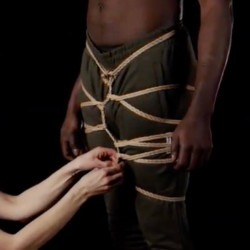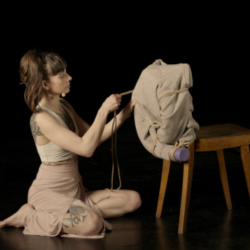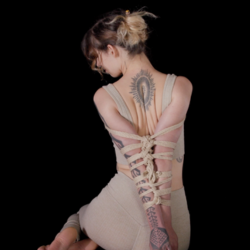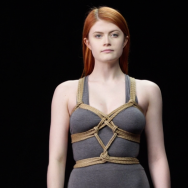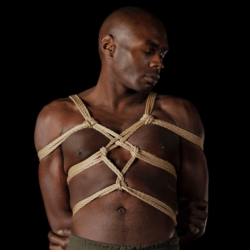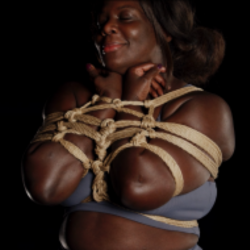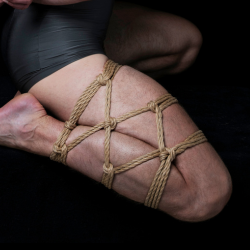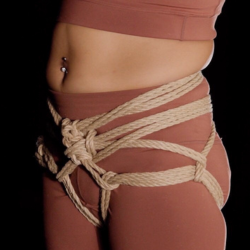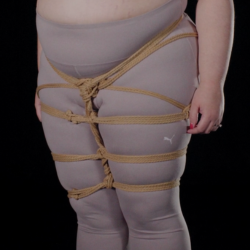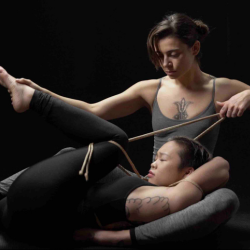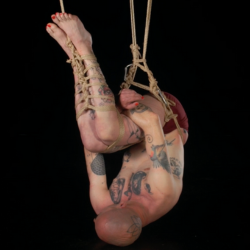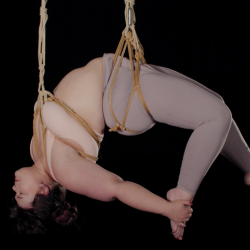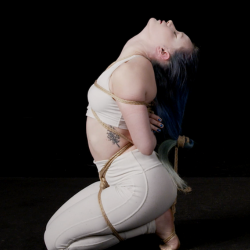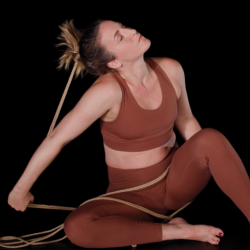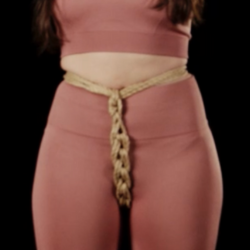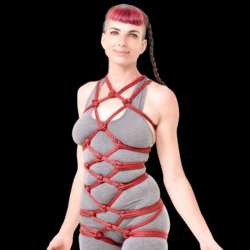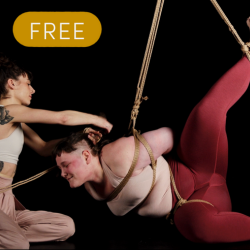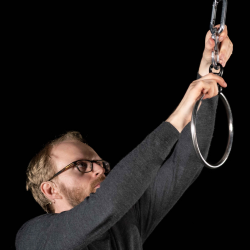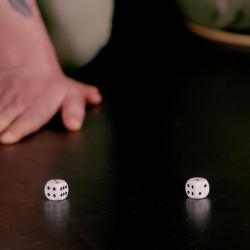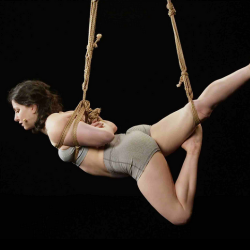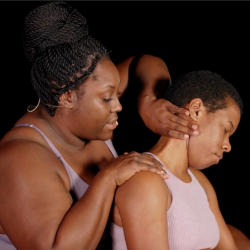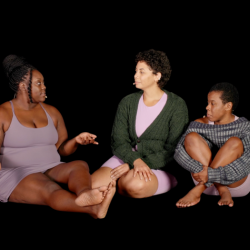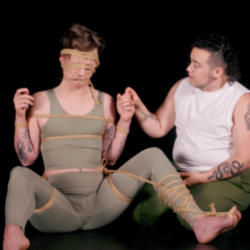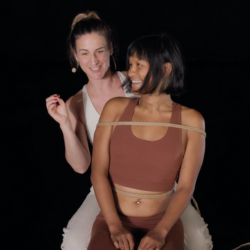EP 16
ANOXIA ROPE
Get ready for laughs and heartwarming insights into Anoxia Rope's passion for rope bondage. The conversation also delves into the vulnerability of being a top and bottom in rope play and how it influenced Anoxia Rope's approach to tying.

Anoxia Rope (they/them) is a Chicago-based rope artist, performer, and educator. Nox loves to deconstruct and synthesize knowledge from an abundance of sources, striving always for a more complete understanding of the interactions of rope, anatomy, psychology, and aesthetics.
After many years of study, they present classes which go beyond patterns and rote memorization to teach underlying principles relevant to students at any point in their rope journey. In play, their rope is often intense, creative, dynamic, and charged with emotional sadism.
They teach privates in their home studio, have presented in small community spaces around the US, and at cons like Tethered Together, Kinkfest, and Desert Bound. Nox also currently serves on the steering committee for NARIX (North American Rope Innovation eXchange).
Wicked Wren [00:00:10] Hello everyone and welcome to the Shibari Study podcast. I'm your host Wren and today I have on my friend Anoxia Rope. Nox uses they/them pronouns and they're from the Chicago area, have been involved in rope for a very long time. Hello Nox, how are you?
Anoxia Rope [00:00:28] Hi, I'm great.
Wicked Wren [00:00:29] Amazing. So on this podcast, I really like intersections. They're really fascinating because there are so many different intersections we have in the rope world. And your page has something unique I've never seen before. And, you know, on Instagram and not only one, you have two rows that have spaghetti in them.
Anoxia Rope [00:00:54] Yes.
Anoxia Rope [00:00:55] Okay. Yeah, absolutely.
Wicked Wren [00:00:57] I feel like you might be the only one.
Anoxia Rope [00:01:00] I'm really curious where this is going.
Wicked Wren [00:01:01] I mean, if you think about spaghetti is kind of like little ropes, right?
Anoxia Rope [00:01:05] Yeah.
Wicked Wren [00:01:06] So, I mean, I guess I'll just have to ask. Like, you know, what's the inspiration for the spaghetti content?
Anoxia Rope [00:01:11] I had a big dream to tie somebody in an absurd amount of spaghetti, and it was something that I've wanted to do since before I knew I was (…), which is kind of weird. But yeah, for my birthday, like 30 people who love me dearly all pitched in to make 900 pounds of spaghetti. And we did just, I think, horrible things in the spaghetti. But I think it really stemmed from a desire to play with something that felt absurd and kind of disgusting. And I loved it. But I will say that really, in the room, every other face was pretty full of disgust. That was perfect. That was exactly what I wanted.
Wicked Wren [00:02:14] We don't really interact with spaghetti in that way.
Anoxia Rope [00:02:17] No, we don't. It is pretty hard to get spaghetti inside of somebody, not through their mouth.
Wicked Wren [00:02:29] I can imagine that. That's one of the hardest noodles to do that with. I do have a logistical question. I mean, how does one cook 900 pounds of spaghetti?
Anoxia Rope [00:02:41] Crowd-sourcing.
Wicked Wren [00:02:43] Got it. Got it.
Anoxia Rope [00:02:44] But also, I will say, and this was probably the worst part, is some of that spaghetti was not cooked. It was reconstituted in water and pasta that has just soaked in water without actually cooking, the glutens don't develop. And so you end up with something that is more like dough than pasta, which added a whole different, honestly like element of disgust. That was really, really fun and very yeast-y.
Wicked Wren [00:03:15] Oh, my God. Has this changed how you enjoy spaghetti going forward?
Anoxia Rope [00:03:23] Well, I can say that there are quite a few people who do not eat spaghetti anymore. I am not one of them.
Wicked Wren [00:03:30] That can really change you.
Anoxia Rope [00:03:32] Yeah. I think spaghetti is still a go-to homie food for me. I maybe look on it a little more fondly now.
Wicked Wren [00:03:45] I love it.
Anoxia Rope [00:03:47] Yeah.
Wicked Wren [00:03:47] So I'm sure that the spaghetti wasn't the beginning of your rope journey. Bring us back to the beginning. How did you find rope? What appealed to you about it? Kind of how did you get involved with things like that?
Anoxia Rope [00:04:02] This story's a little embarrassing, especially in the context of talking to you, because I got into rope when one of your co-host humans started posting rope photos on Tumblr ten years ago.
Wicked Wren [00:04:24] I love it.
Anoxia Rope [00:04:26] And honestly, I found Cam's Tumblr in 2013 and was like, That's hot stuff.
Wicked Wren [00:04:36] You're like, There's something here.
Anoxia Rope [00:04:38] Yeah. And it took me another two years before I ever did anything besides follow people on Tumblr who posted rope photos. But then one day someone in my close circle who knew that I liked pictures of, I think especially like I was really caught by what felt almost like the romanticization of the damsel in distress trope and that beautiful, vulnerable person tied up. And so I had friends who knew that I really liked that and were like, Hey, do you want to come to a rope class? Wow. And from there it was kind of the rest is history. I was very quickly tying 30 or 40 hours a week, and while I quit my job and moved back in with my parents and spent like two years of income on taking rope classes and just made all rope all the time in my life. And now I get to tie people up and it's really damn hot. It's been my dream.
Wicked Wren [00:05:52] It is. I think it's – I do want to comment. I think it's funny that you started that story saying it was like an embarrassing thing after talking about the 900 pounds of spaghetti situation. And it's just one we're in a world where being like, yeah, spaghetti easy, but then, you know, talking about other things hard.
Anoxia Rope [00:06:12] I think the thing actually it's easy to say, Oh yeah, we do these cool things. It's hard to express our interest, affection, admiration for each other. Like that part is hard. And so saying I have this admiration or there's a human who brought me into this that feels more vulnerable than saying, I like to stick spaghetti inside of people.
Wicked Wren [00:06:38] It really is, honestly. Do you find that you are this like, I don't know if obsessive is the right word, but you go into things this heavily in your life?
Anoxia Rope [00:06:50] No, I think that was actually kind of the thing about rope that was so special is I think I always had kind of – like I would try something and if I wasn't good at it, I didn't stick to it. And I had wandering focus and like change my major in college maybe 12 times. SoI really struggled to find something that I liked. And when I found rope, I think one of the things for me is I found discipline. I found something that captured my attention so fully in a way that nothing else ever had and still nothing else really has. And so for me, rope is like I'm all in on rope. I joke that I'm a little bit like a golden retriever with a ball. Like rope is life. Ball is life. Have you heard about our lord and savior rope?
Wicked Wren [00:07:45] It's pretty wild how rope does that because, you know, there's a lot of stuff in the (…) world, obviously, but I just haven't seen anyone feel, you know, towards other things like they do towards rope. It's really all-consuming.
Anoxia Rope [00:08:01] Yeah, absolutely. But I don't regret it at all. And I think it's one of the things that I like about other rope people is we have this shared like, Oh, yeah, this is the good stuff.
Wicked Wren [00:08:14] Yeah, exactly. Exactly. Yeah. During covid, it really – I feel like it helped me kind of get through it and add structure and stuff like that because, you know, during covid I was with my rope partner for a lot of it at the time and we would tie and it added a lot of really cool, I don't know, structure to a time that had none.
Anoxia Rope [00:08:37] Hmm. It's interesting because before the pandemic, I was tying 40 hours a week and the pandemic happened and I stopped tying kind of all of a sudden completely for two years. And I – rope for me right before the pandemic took me to a place where I had such incredible connections and partnerships. And what I found with the pandemic was that kind of like heartbroken. This thing is gone now, but it was also a good reminder of just how good it had been. And I got really into macrame during the pandemic. That was like the way that I coped with not being able to tie people.
Wicked Wren [00:09:34] It's like rope light.
Anoxia Rope [00:09:35] Yes.
Wicked Wren [00:09:37] Do you still do macrame?
Anoxia Rope [00:09:39] I do. Yeah. The other thing I got really into was plants during the pandemic. And so I like, I tie people and I tie plants.
Wicked Wren [00:09:47] I love it. I'm so bad at plants. I can't keep any plants alive.
Anoxia Rope [00:09:52] I thought I was, too. And then it turns out when you're stuck in your house staring at them, it's hard to be bad at plants.
Wicked Wren [00:09:58] That's a really good point. And I've tried to, like, reverse my thinking on this why I am so quick to say I'm bad at things, but in actuality, I just don't know stuff about it. When you were finding rope, so you said that rope is the first thing that really kept your attention. What were some of the big, I guess, hurdles with that? Did you have any times where you kind of had a low or something like that and or any big hurdles you had to overcome in the beginning?
Anoxia Rope [00:10:26] When you're first learning, there's this focus on harnesses and learning all the different patterns and learning how everything works and maybe learning like the different styles of rope. And then as you get further in your journey, the things that you're learning are less measurable and concrete. And so I found that I had less of the, like instant gratification of like I learned a new harness check. And I think the other thing for me is, so I'm a (…) and I like that discomfort of spaghetti because I love when people are uncomfortable. I love when people are in pain. And rope was kind of the place that I learned that there are people that like to be on the receiving end of all of that. But for me, at the beginning, I think the other thing I had to learn was like one that it's okay for me to want to hurt people, but two what does that look like and how to slow down and not let the frenzy take over? Like excitement of getting permission to do this thing.
Wicked Wren [00:11:36] Can you talk a little bit about the collaboration that is present in a D/s relationship and those kinds of things?
Anoxia Rope [00:11:43] Yeah, I have a couple of partners with whom we play pretty heavy and do sort of a does focus on group. And I think for me it's interesting because what I like in that power dynamic is I like the control, I like the romanticization of suffering. Like tying somebody on trains, tying somebody up turns me on. But I think especially I like when somebody else is suffering for me and I like when they're doing like I think that people like to be in a state of stasis or comfort. And so to me, it says so much about their intention and care when they're willing to go outside of that stasis or outside of their comfort or my sake. I love that. And I think that the partners that I have that play with me that way. They recognize that that's like an act of adoration. And then them being willing to do that gives me the opportunity to give adoration back.
Wicked Wren [00:13:04] That's beautiful the way you said that. I have of a lot of things on like my don't really love list, but aren't reds by any means. It's just like, I don't really love them, but I hesitate to kind of bring those things up because I do like to do them if like a top likes them, because that adds new context to it and it's like an act of service. And if someone else is really enjoying it, then I'm gonna really enjoy it. Like anybody's excited to talk about something that is, that's a fun thing to be a part of.
Anoxia Rope [00:13:44] I think that I even found like early on when somebody really liked pain and when they really enjoyed it, that was actually less fun for me. Like I didn't want to be giving somebody an experience that they already wanted and would do with anybody. I wanted to get the thing that they didn't really want to do but were going to do for me because it spoke more to the relationship that we were building than me just facilitating a thing that they would have ordered from anybody.
Wicked Wren [00:14:13] That's like, that's also really, really it. And I get the same things when I'm topping someone and someone's really into it and they're like, Destroy me. It's like I kind of lose interest in a way, you know? I'm like, I don't know. It's just like, I was like, All right, well.
Anoxia Rope [00:14:30] It's not about us anymore. It's about you wanting that thing.
Wicked Wren [00:14:35] Yeah, and very selfish.
Anoxia Rope [00:14:38] Yes. Yes. I think that might be a known flaw that I really appreciate that my partners validate in me is that I'm selfish. I want this to be about what I want.
Wicked Wren [00:14:50] It is pretty wild because there's this line of like when someone is topping, especially in rope as a bottom, I don't want to really say I want this position and this and this and this. Like, I don't want to say those things. Like, I have things that I like, obviously, but I want that person to make decisions based on what I'm doing and reacting to in rope versus like, you know, collaborating on this scene I guess. Like I don't know, it's a very fine line, obviously.
Anoxia Rope [00:15:20] Absolutely is a fine line. And it's interesting when I talk so, I am at the point in my life where I'm comfortable saying these are the things that I like. These are the things that I want from you, and this is how you can show this interest in me. But it's so hard as a top to find that balance of saying something that you want to do in a way that doesn't feel coercive in a way that doesn't lead somebody to agree to something that they actually really wouldn't do.
Wicked Wren [00:15:55] Yes, the implied power dynamics in these situations are so, so hard. And it's like we really take these things for granted, you know, like someone jas a lot of followers. Someone's really cool. You've known them for a long time. You want to be strong. It's like, that was a lot of the beginning of my time in rope was everyone, like we use the phrase you're a power bottom. You're so strong in rope as this badge of honor and as a bottom, you want that input. So it's like, I'm not saying I did things I didn't want to do, but also it wasn't really about me. It was about like my ego.
Anoxia Rope [00:16:33] Yeah. I think it's also – like it's scary to say, I want you to do this as a top and have like, try to guess. Is this person saying yes because of the power that I have? Are they saying yes because they care about me? I think it's a lot easier when you have a relationship with somebody, whether that's a friendship or a play partnership or something that's romantic. I think the other thing that's hard about it is besides the fear of coercion or the fear of how real is the answer that I'm getting back, it's just hard to express what you want. Like it's hard for me to say to a room of people, I really want to shove somebody full of spaghetti because there's an amount of vulnerability to saying, Hey, that's the thing that I find (…). Please don't judge me for it.
Wicked Wren [00:17:24] Yeah, totally.
Anoxia Rope [00:17:26] I think that coming to terms with being able to articulate what I want was also really scary. And I think it's interesting, like as a femme presenting rigger, oftentimes bottoms will come tie with me and they'll say, you know, I want to tie with you because I don't think you're going to (…) me. I'm like, Oh, buddy, Yeah, I actually do (…) rope and tying people up, and I don't want my desires to be dismissed. I want the opportunity to talk about them and find where those are going to feel good together.
Wicked Wren [00:18:00] Yeah, that's funny. It's like some of the femme presenting or women that tie are some of the most (…) people, you know, that I've been tied for.
Anoxia Rope [00:18:12] And (…) people who are not – I think that the ability to separate (…) and sexuality is really interesting. Like, Oh, you're just going to hurt me. You're not going to hurt me in a way that's about the (…). And I'm like, No, I'm going to hurt you in a way that is (…).
Wicked Wren [00:18:28] Yeah, exactly. You're like, This is why we're here. This is what we're doing.
Anoxia Rope [00:18:32] Mm-hmm.
Wicked Wren [00:18:33] How long did it take to kind of, like, uncover that suffer? Did you know that stuff in the beginning?
Anoxia Rope [00:18:39] No, rope helped me uncover that stuff. I think that, that's I mean, that's part of why rope is life is that rope is a tool that allows me to connect and find the language or find the intimacy with somebody that allows me to have those conversations. And I think for me, talking to other tops really helped. Like I am such a proponent of make friends with people that you're not going to tie with that you don't want to tie with. Because having their perspectives, sharing information, having a network of people who have totally different approaches and understanding how those approaches don't or do resonate gives you information about yourself.
Wicked Wren [00:19:29] You talked about like building community and things like that. What is your relationship with the word community?
Anoxia Rope [00:19:38] I run this, I've been running this discussion group that meets once a month for the last three years. And we have had the discussion what is a community probably like 15 times. Like at this point, there's dirty players when the word community comes into the room. I think your community is your friends and I think that like community is people that care about each other, that are invested in each other, that have desire to build a type of world together. Like I think of rope as prefigurative. It's creating the kind of world that I want to be in. And my community isn't everybody that does rope. My community is the people that I care about, and some of those people do rope.
Wicked Wren [00:20:27] I love that. You need that outside influence. Rope does take over so many people's lives. And for me, I felt like if I look at when I was healthy versus when it wasn't healthy, the part I wasn't really healthy was when I only had rope people in as input, you know. And I didn't really have other stuff going on. Like some people could give me other ideas and other thoughts and stuff like that, you know.
Anoxia Rope [00:20:53] I think, unfortunately, my other friends have to deal with the fact that everything about me is about rope. So I am, I think probably most of my friends are rope people, but the ones that aren't are like Dungeons and Dragons friends or they're dance friends or foodie friends.
Wicked Wren [00:21:12] I think the Venn diagram for rope people and Dungeons and Dragons people, you know, it's like it's a circle. It's almost a circle. Do you play Dungeons and Dragons?
Anoxia Rope [00:21:24] All the time, yeah.
Wicked Wren [00:21:26] I just did my first campaign.
Anoxia Rope [00:21:28] Oh. How are you liking it? What's your character? Describe your character.
Wicked Wren [00:21:36] I'm a human fighter and her name is Selina Gamble, and she has, she's the heir to the Procter and Gamble fortune, but she doesn't want to have anything to do with that previous life. She wants to start her own path. So that's her story.
Anoxia Rope [00:21:54] Fight her way to a new life.
Wicked Wren [00:21:56] Yes, exactly. So she doesn't use any of her parent's help and her billion-dollar fortune. And then she has a fight her way into a new life. And then there's like (inaudible) as a character. There's another one. It's like, yes, I would just say it's kind of a fun game, if you will.
Anoxia Rope [00:22:16] Yeah, I love that. I play in a game where I'm a level 20 wizard and I'm trying to play through all of the D&D modules myself in kind of this like solo campaign. It's really, really fun. But I have a propensity for ridiculousness, so.
Wicked Wren [00:22:38] I can tell.
Anoxia Rope [00:22:39] Yeah. What was it that gave me away? The spaghetti?
Wicked Wren [00:22:43] Yeah. You know, it gave me a give me an idea, you know, gave me a little bit of a clue.
Anoxia Rope [00:22:50] If it wasn't the spaghetti, I think the next one would have been the harmonica (…) I love. I have this harmonica (…) I play with, and it is so ridiculous. And like, I think the shame of the person wearing the harmonica (…) when they realize that all of those, like sad sobs of pain are just like squeaky gritty noises.
Wicked Wren [00:23:12] So okay. So I'm like, I'm in a partial, you know, there's some rope that's up in my ribs and I'm barely breathing, and you put a harmonica (…) on me, and then I'm, what are, are you laughing at me out loud? What is, what are you doing?
Anoxia Rope [00:23:28] Oh, I'm – especially the harmonica (…) comes out when it's like a quiet night. And I've talked to people in advance, and I know I'm not going to, like, mess anything up for anybody else. But, like, the vibe was that the vibe was supposed to be soft and (…), and there's maybe 15 people around and you're suffering and you think you're beautiful. And then the harmonica (…) goes in and you're just wheezing and people start laughing immediately because how do they not laugh? And we're like, awful. It's not a cute noise. It's like, because there's also snot and tears and you're trying to breathe around the harmonica (…).
Wicked Wren [00:24:08] Yeah.
Anoxia Rope [00:24:09] No, I'm and I think for me, what I'm doing is like, pointing out to you. Didn't you think you were going to be beautiful? Didn't you think that this was going to be a dream? What do you think all these people think of you?
Wicked Wren [00:24:24] Yeah.
Anoxia Rope [00:24:26] You're ridiculous.
Wicked Wren [00:24:27] You can't play it cool with a harmonica (…).
Anoxia Rope [00:24:30] No, can't.
Wicked Wren [00:24:32] So you were in an intensive that I was in, and it was fun to watch you tie and you get this, like, face of just, it's just, it's like it's scary. It's intense and it's scary. And I just really loved it.
Anoxia Rope [00:24:49] I think I've been told that my tying face. So I've been told that I'm pretty expressive. And when I'm tying, I know oftentimes I'm like, smiling so wide because I'm just like, giggly, happy at watching somebody suffer. I found in work, my colleagues are pinning me to their screens during big meetings so that they can watch my expressive face react to things. And that's my nightmare. So I'm, I think I'm sure I'm really interesting to watch, but I have no idea what my face is doing. I can't control it.
Wicked Wren [00:25:29] So why is that your nightmare that they would pin that?
Anoxia Rope [00:25:35] Oh, man, I don't really want to be the focal point. Like, for me, I'm the facilitator. I'm the like, I think of the person I'm tying as the focal point, the center of attention, the like I'm putting them on display. I don't want to be on display. That's, I do bottom sometimes and I think, like for me, the hardest part about being a bottom is being seen and having one person's attention so entirely on you. And I think even when I'm tying, I don't feel that way because I feel like their attention is also on the rope. But when I'm bottoming, I know that I am the thing that their attention is on. And that is the scariest thing in the world.
Wicked Wren [00:26:25] It really is, isn't it? Yeah. The care that the other person puts into you, like when you're bottoming, is really intoxicating.
Anoxia Rope [00:26:38] There's not a lot of other like when we do activities with each other, when we have (…) with each other, when we are watching movies or playing D and D, like everybody's having also their own experience and focused on their own joy. And I know I said that, like, when I tie, I want to do what I want to do. But the other thing is that, like, all of my attention is on them. They are the experience that's happening. It's been really hard as a top to navigate that the world falls away and this person's existence is the only thing that is happening.
Wicked Wren [00:27:19] Even as a top, if you're doing what you want to do, you're still getting input from the human that you're doing it to. They're still shaping the experience, even if you're doing, you know, all the different things in your toolbox that you've gathered over years and years and years and years. You're choosing that.
Anoxia Rope [00:27:38] That's the thing that was interesting about starting to bottom too. Because I'm a top-leaning switch. I started rope topping, only really found bottoming maybe in the last couple of years. When I bottomed, I discovered that even when my top wasn't doing something, I was still in rope. I was still having an experience and my top didn't need to like, take action and move and do things actively for my experience to persist. And it gave me permission as a top to slow down and to watch and to know that, like, I don't need to be hyperactive to make my partner experience something. They are experiencing something, they exist, they are there. How do I notice that and create space for them to feel that and then shape that experience, but like carefully and in a way that allows the space for them to feel it and not just like be overwhelmed by the barrage of actions that I'm taking in their direction.
Wicked Wren [00:28:42] Yeah, that slowing down and letting there be space and stuff is so difficult and everything. I mean it's hard to do in music. It's hard to do in (…). Do you feel like bottoming informed your topping?
Anoxia Rope [00:28:57] I think it did. For sure, absolutely. I think it would have been crazy if it hadn't. I'm a mas– or I'm a (…), but I'm not a (…). And so I think the first reaction that I had was Jesus Christ, I do this to people, what the heck but like I holy crap, this is awful.
Wicked Wren [00:29:16] Yeah.
Anoxia Rope [00:29:17] I wasn't expecting it to be quite that bad.
Wicked Wren [00:29:22] Yeah, futos aren't fun.
Anoxia Rope [00:29:25] No. No. God damn. Rope on your ribs. Like, who does that? I don't know why pain hurts so much, but.
Wicked Wren [00:29:35] That's so funny.
Anoxia Rope [00:29:36] I think it gave me, I think that's part of what made me slow down, is I realized like, Oh yeah, no, it hurts when you're not doing anything. Like, let that be the experience.
Wicked Wren [00:29:48] Yeah. Do you feel like It's made you, I don't want to say second guess the amount of pain that you're putting in, because this is, this is – go on. Sorry.
Anoxia Rope [00:29:59] No, I'm just thinking through that question.
Wicked Wren [00:30:05] It's a hard thing to, like, communicate, because when you don't know, you don't know. And you just, you just do. You know, you're like, the rope goes on the ribs. This is what we're doing. And as a bottom, that actually feels really good because you're like, I'm here and there's no, you know, getting out of this and you kind of accept the fact that you're in that place. But once, you know, does that knowledge help or does it inform or do you think that it does kind of the opposite?
Wicked Wren [00:30:34] I think my approach to rope, my thought, like if I had to sum it up into one thing is do the thing that you're trying to do reliably on purpose every time. Like whatever it is that you're trying to do, make sure that you're good enough to do it and make sure that you're consistent enough to do it regularly. And I think that when I didn't know what rope felt like, I think I was less successful at regularly creating the experiences that I was trying to create. And I think that knowing what rope feels like has helped me to be, I think, more precise about exactly what it is that I'm trying to create as an experience. And in some ways I think I am probably worse. I'm probably far more calculating and specific in the pain that I cause.
Wicked Wren [00:31:32] Was literally about to say that. Because one of the people I tie with is also switch and gets tied often. And it is the most brutal and scary because they know and they can just like make a little adjustment. And then there's another part of your body that can get hurt and there's none of that like, I don't know, it's like knowing it, It's terrifying.
Anoxia Rope [00:31:55] When you find out how much it hurts to just have bands redressed and how much it is like that there's all this pain associated with that rope that you weren't paying attention to got caught between my toes, and now you're yanking it through. And I like, I found that when I was bottoming, all of those things were distracting and they weren't like, they didn't feel like my top was doing them on purpose. So the power of only causing the pain that you exactly mean to cause and not having all of this peripheral pain that feels like your...
Wicked Wren [00:32:27] It's annoying.
Anoxia Rope [00:32:28] Well, and I think that it really helps with D/s and with control and with power exchange is when your partner believes that the experience that they're having is crafted and intentional and that every ounce of suffering is there because that's exactly what you want them to experience. It makes them trust but also, like, have to endure that. That is what they're there for.
Wicked Wren [00:32:57] That is a very wise thing. Yeah. Cam and I, we joke a lot about someone who keeps running a TK line eight times. You're like, you're like, I'm good. Like...
Anoxia Rope [00:33:10] I'm actually done, you know?
Wicked Wren [00:33:13] Like, we can just stop. We stop. But I'm good, actually. But that, that makes, like, me as a bottom feel so much more afraid of every little thing. Cause I'm like, okay, do we understand how much this seemingly easy thing is or whatever? I don't know. That, it's the very wise words you said.
Anoxia Rope [00:33:35] Yeah. If you don't feel like your top knows what you're experiencing, I think you feel more responsible, maybe hyper-vigilant. Like you need to advocate for yourself because maybe they won't. But I think as a top, if you can be skilled and precise and if you can cut through all of the noise of the things that you're bad at and find the things that you're good at and be really careful with them, that's also how you build trust with your partners. It's how you show that you care. It's how you get to a place where you can do the hard stuff because you both know that it's happening on purpose.
Wicked Wren [00:34:22] Yeah. So it begs the question, like someone who is super skilled in rope like you are. Like, I look at you and I'm like, you can do anything. You can do everything. What are some things that you don't like doing or you think that you're bad at or something?
Anoxia Rope [00:34:39] Oh, I usually when I find something that I'm not good at in rope, I drill it to death. And so I, like if there's a thing that's hard for me, that's the thing that I'm going to work on.
Wicked Wren [00:34:51] What were some of those things?
Anoxia Rope [00:34:53] I think touch was one where I thought that I was touching my partner and I thought that I was being connective with my touch. And it took like my bottom telling me every time I was touching them to realize that most of the time I'm not. I think pausing and taking rests. I would take what felt like a full breath for me and then realize that actually I'm moving so fast that that full breath was not enough time. So that's slowing down. I think right now it's interesting. I think I'm focused on body mechanics and actually not my partner's body mechanics. I feel pretty okay about like how to move a person through space. I think I'm focused on like my physicality and how do I protect myself and like tie in a way that's going to give me the ability to tie for longer because I love rope and injuries over time in your fingers and I've had back injuries from tying and I've had I think like I'm recognizing that I need to be careful with myself and with my own body to keep doing this thing. And age is a never-ending movement of time, but I'm going to have to figure out how to navigate. So I think like how to move. I think also one thing that I've been really enjoying is looking at just incredible performances and also performances outside of rope and like performances and circus. And I really, I think I want to take like physical comedy classes and work on like, how do I move my body to express things.
Wicked Wren [00:36:40] If you're okay with it, I would love to talk about touch and your journey with that.
Wicked Wren [00:36:45] I think when I first started in rope, I was touching the rope and the rope was touching the person. And I was using rope to touch somebody. And I heard a wonderful human, say recently rope is an extension of your touch. Rope is, it takes your touch and it allows you to bring that further around your person. And so I think I, I maybe was doing that in the like rope is the only form of touch. Like I'm using rope to interact with this body because I don't feel comfortable with putting my skin against the skin. And I think that finding that rope is touch, but skin is touch and they are different. And how do you play with them and how do you alternate them and how do you allow rope to be hard touch and skin to be soft touch or vice versa. I think gives me more tools to play with.
Wicked Wren [00:37:46] I always found that when I have skin-on-skin touch, it allows me to have more rope on my skin.
Anoxia Rope [00:37:54] I think it's like co-regulating. Like in the same way that when things are really emotional and you get a hug from somebody and it helps you calm down. I mean, I think that's one of my goals, is to never let go of a hug too early. And so thinking about how do you offer touch as a like calming and I think that's also like when I'm tying somebody and they can't breathe and they're struggling and they're gasping and crying. But the impact of stopping the rope and just putting a hand on their body and saying, this hand is showing you where my attention is. This hand is showing you that it's not about the rope, it's about you.
Wicked Wren [00:38:39] Yeah. And that's what we really love about rope, is that attention, you know, whether you're a top or bottom. Rope is one of those things that really sets up an area for communication and for talk around these things. And I always said that I wish that more people could experience that because you have to be radically honest. And I just, I wish that more people were able to have that kind of like space for communication.
Anoxia Rope [00:39:05] Yeah, I think it's hard to say what your desires are. It's hard to admit that these are the things that turn me on. It's also hard to say these are my needs and I would love to have you meet them. And it's hard to say, These are my boundaries and these are the things that and hold those boundaries. And I think for me, rope is that like container that creates the opportunity. But it's also for me, rope helps build the world that I want to be in, and that rope makes me be vulnerable. It makes me think about how I'm showing up in the world. It makes me think about the impact that I'm having on other people. It makes me practice empathy. I find that again, being friends with people that you don't tie with, you find that in the discussion groups or talking with other tops. We're not necessarily talking about what is the cool new harness that you learned? We're talking about what do you do when you've hurt somebody? And how do you navigate that and how do you like show real care and a desire to continue to be in community? In like real community with people? And for me, that's the thing that's amazing is like, I don't know that I would have ever had those conversations if I hadn't gotten into rope.
Wicked Wren [00:40:29] Yeah, I agree. It does facilitate those things.
Anoxia Rope [00:40:32] Yeah, I think, I really appreciate the discussion group that I run. I appreciate my friends who are willing to have those conversations with me. There's also like, so I will pitch, I'm on the NARIX committee and NARIX is this rope unconference and that whole model is everybody is here to contribute. Everyone is here to participate and share what their perspectives are, what the things that they do in rope are. But there's so much room in that conference model for people to connect and like get into the meaty things about how we exist in the world. And so I love that, like bringing people together and using rope as a place where we talk about what our values are.
Wicked Wren [00:41:18] Can you tell us a little bit more about NARIX? When is it? Where is it?
Anoxia Rope [00:41:23] Yes, absolutely. I would love to. You know, NARIX is short for North American Rope Innovation Exchange. It's been going since 2014. And it's an unconference model, which means you don't have, like traditional presenters. Everybody is considered a contributor. And there's an application process. There's sort of a, it's not a great first conference for folks. It's a really good conference for folks with a lot of experience looking to like, take things to the next level. We usually get a lot of organizers and people that are really invested in those questions of like what is community that apply. And then it's three or four days together doing sessions and collaborations and discussions. And this one, the next one is actually coming up here. We've already sent out all of the acceptance letters and it will happen right in the beginning of May in Philadelphia. The last one was last summer in Montreal, and I think we'll have another one coming up in the fall here soon. So people should keep an eye. There's a NARIX host on Instagram where we post news about when applications open up. So those that'll happen in the next month or two.
Wicked Wren [00:42:46] That's amazing. Yeah. Thanks for saying that. Is there anything else going on with you that you want to tell us about? Like on Instagram? Stuff like that?
Anoxia Rope [00:42:56] Yeah, I'm on Instagram as @anoxiarope. I'm on FL as anoxia. I'm presenting at Rope Craft here in Chicago at the end of May. I'm teaching in Madison, Wisconsin, in August. I love traveling, love teaching, love seeing people learn how to use rope to connect. So I'm hoping to do more of that, too.
Wicked Wren [00:43:21] Amazing. Well, thank you so much for being on. This is awesome.
Anoxia Rope [00:43:25] Yeah. Thank you so much for having me. I love this.
Wicked Wren [00:43:28] You're so welcome. We'll see each other at NARIX.
Anoxia Rope [00:43:30] Sounds great. I can't wait.
Start your free 7-day trial
Get one free week of unlimited access at Shibari Study,
then pay from $17.90/month. Cancel anytime.


